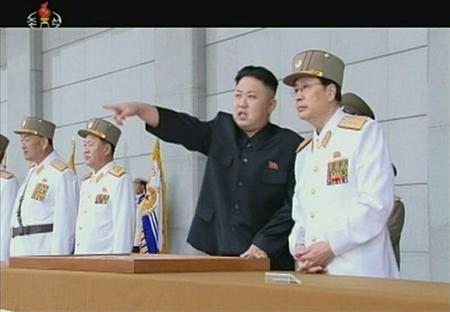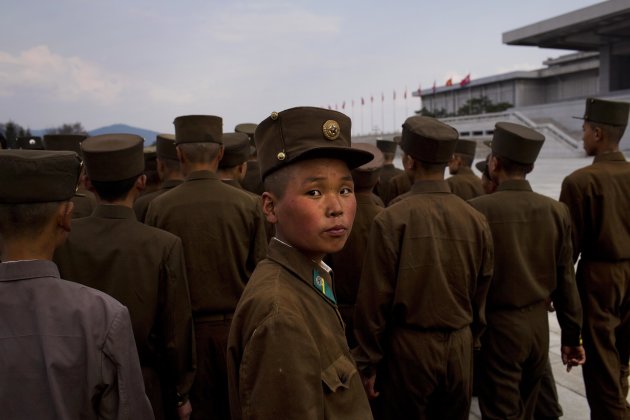
Reuters/Reuters - North Korean leader Kim Jong-un (2nd R) points during a military ceremony in this still image taken from video footage released on April 25, 2013, by the North's state-run television KRT.
By David Chance and Paul Eckert
SEOUL/WASHINGTON (Reuters) - If North Korea's bellicose rhetoric threatening the United States and South Korea with nuclear war was aimed at dragging Washington to the negotiating table, it has likely failed.
Pyongyang may once again feel it needs to up the ante.
Two months of shrill threats following the North's nuclear test
in February appeared at times to drag the Korean peninsula close to war
as its young leader celebrated a year in power with a fusillade of
verbal aggression that has now died down.
North Korea has
made it clear it will not talk unless its right to a nuclear deterrent -
its "treasured sword" - is recognized by the United States, while Washington insists any talks would be conditional on denuclearization.
That may lead to Pyongyang staging a new long-range
rocket launch - which critics say is designed to prove missile
technology - or a fourth nuclear test, or a small-scale military
confrontation with South Korea in a bid to force talks and perhaps split
Seoul from Washington."The difference in positions between the United States and North Korea is greater than ever," said Chun Yung-woo, South Korea's former national security advisor who left office in February and took part in framing U.N. sanctions on North Korea for its nuclear test that month.
Chun took part in meetings with North Korean negotiators as part of "six-party talks", a series that ran from 2003 among the two Koreas, China, the United States, Japan and Russia that were aimed at stemming the North's progress towards a nuclear bomb. He participated in talks in 2006 and in 2008, the last round.
The North has said it wants the United States to sign a formal peace treaty formally ending the 1950-53 Korean War, an end to U.N. sanctions and a pledge from Washington and Seoul not to attack it, as well as nuclear recognition.
"It has become much more difficult to seek common ground and find the right conditions for talks," said Chun, referring to the preconditions set out by Pyongyang.
North Korea has a long history of spurning engagement and trust-building measures. During the six-party talks, it agreed to abandon all of its nuclear weapons programs in 2005, only to stage nuclear tests in 2006 and 2009 as well as this year.
As recently as last year, it said it would allow nuclear inspectors back into the country, not launch any long-range rockets and go back to talks in exchange for U.S. food aid.
Just a few weeks later as Kim Jong-un formally took power, it undertook another rocket launch, scuppering the deal.
The lack of trust and verification means that once bitten, President Barack Obama
is unlikely to fall for a second North Korean ploy, especially after
crude propaganda films depicted the United States in flames from a North
Korean attack.
"Because it is North Korea, the decision goes all the
way to the Oval Office and I just don't see President Obama wanting to
make any investment in this," said Victor Cha, formerly President George
W. Bush's top advisor on North Korean affairs.CHINA CARD?
Beijing is North Korea's one ally and could provide a route back into talks, although it too has expressed its frustration with the North's young leader.
When Kim Jong-un took office, there were hopes he would break with his father's push for nuclear weapons and embark on Chinese-style economic reforms.
But a year later, the young leader has still not paid a visit to Beijing. And instead of reforming, he has spent the past year purging the military and shuffling his close advisors. He has now staged two long-range rocket launches and one nuclear test.
"China is not very happy with Kim Jong-un for creating trouble," a source with close ties to Pyongyang and Beijing said.
"Kim Jong-un has been testing his control over the military through mobilization, but he overdid it."
Despite Beijing's displeasure, the young Kim may feel he has little more to lose.
Most analysts say that despite agreeing to sanctions on North Korea after February's nuclear test, Beijing will not economically strangle a client state that provides a buffer between it and U.S. forces stationed in South Korea.
South Korea's new President Park Geun-hye will meet Obama in Washington on May 7, providing the North with something it could use as another leverage point for a missile launch, nuclear test or other show of military strength.
North Korea carried out its February nuclear test just as Park was about to take office and as new U.S. Secretary of State John Kerry took up his post. The test also came at around the time of leadership transitions in Tokyo and Beijing.
"The reason things calmed down over the past 10 days or so ... was not bluster fatigue setting in, or not deciding strategically to tone things down now after having been on the rampage for so long, but more to catch their adversaries off their guard," said Sung-Yoon Lee, Professor of Korean Studies at the Fletcher School at Tufts University in the United States.
(Additional reporting by Benjamin Kang Lim in BEIJING; Writing by David Chance; Editing by Mark Bendeich)

![Cars burn after al-Shabaab suicide bombers attacked the Benadir regional court complex in Mogadishu on April 14, 2013. [Mohamed Abdiwahab/AFP]](http://sabahionline.com/shared/images/2013/04/26/somalia-shabaab-attack-340_227.jpg)